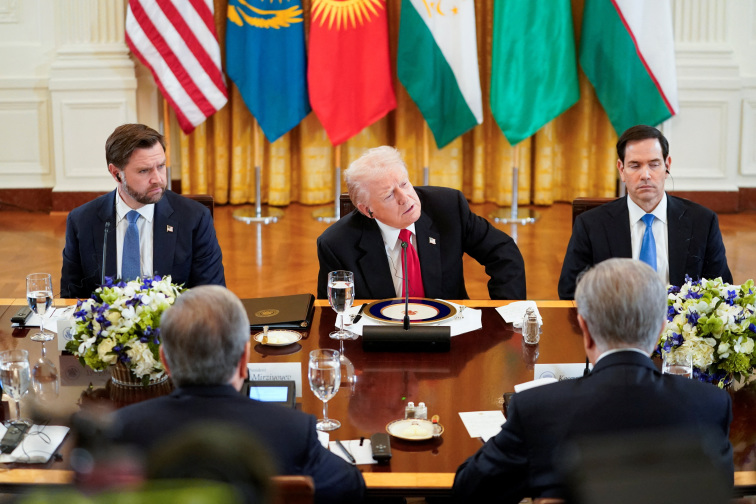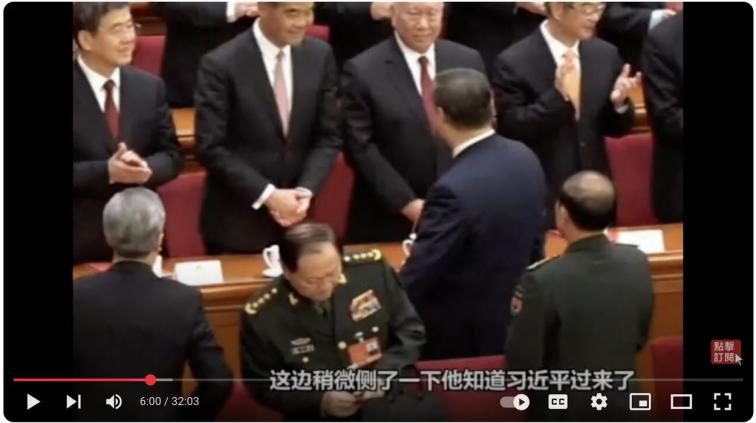The five Central Asian countries are also publicly leaning toward the United States, making the CCP even more uneasy, fearing a situation of being surrounded on three sides. (Google Maps)
[People News] On November 6, U.S. President Donald Trump held a “C5+1” summit at the White House with the presidents of the five Central Asian countries, a scene the CCP certainly did not want to see. Trump’s recent Asia trip yielded substantial gains at the ASEAN Summit, in Japan, and in South Korea, already driving the CCP to distraction. Now, with the five Central Asian countries also publicly leaning toward the United States, the CCP is even more on pins and needles, fearing it will fall into a predicament of being surrounded on three sides.
Trump’s Critical Minerals Card
When Trump hosted the presidents of Kazakhstan, Uzbekistan, Kyrgyzstan, Tajikistan, and Turkmenistan at the White House on November 6, he said, “One of the key items on our agenda is critical minerals. In recent weeks, my administration has strengthened America’s economic security by expanding our critical minerals supply chain through agreements with allies and friends around the world.”
After returning to the White House, Trump first signed a minerals agreement with Ukraine while also beginning to push for a Russia-Ukraine ceasefire. Russia also hopes to cooperate with the United States in the field of critical minerals. After Trump mediated the conflict between India and Pakistan, Pakistan proactively expressed willingness to cooperate with the United States in developing its own critical minerals and even proposed joint development of Pakistani ports. Recently, Trump has successively signed critical minerals agreements with ASEAN countries and Australia, quickly achieving a diversified layout.
The CCP originally thought that rare earth controls were a trump card, but it seems they are no longer effective. Trump is now continuing to implement his critical minerals layout and has even attracted the five Central Asian countries. The Central Asia that the CCP thought it had already secured now faces major variables.
Trump also said, “These countries are located along the ancient Silk Road connecting East and West... Today, they still occupy the heart of the Eurasian continent, giving them incredible importance and unlimited potential.” He pledged to make the partnership between the United States and the Central Asian countries “stronger than ever before.”
The presidents of the five Central Asian countries spoke one after another, all expressing a strong desire to expand and deepen cooperation with the United States. This punctured the CCP’s previous one-sided propaganda.
On June 17, CCP leader Xi Jinping visited Kazakhstan to attend the second China-Central Asia Summit, where the same five Central Asian presidents were present. In his speech at the time, Xi stated that he was willing to join hands with all parties to “oppose hegemonism and power politics.” The CCP leader was essentially publicly trying to pull the five countries together to unite against the United States.
Xinhua News Agency subsequently published an article titled “The Call of the Times, the Inevitability of History—Deeply Understanding the Broad Connotations of the ‘China-Central Asia Spirit’,” vigorously promoting that cooperation between the CCP and Central Asia is a “model of South-South cooperation” and claiming its significance “far exceeds the bilateral and regional scope,” as a “China-Central Asia solution” to crack “unilateralism and hegemonism.”
According to the CCP’s propaganda, the five Central Asian countries sided with the CCP amid the U.S.-China confrontation. However, five months later, the presidents of the five Central Asian countries visited the White House and all expressed willingness to strengthen critical minerals and more economic cooperation.
Even more ironic is that these five countries hope to help the United States counter the CCP’s controls on critical minerals, essentially using the CCP as a foil to lean toward the United States. The public statements from several presidents are estimated to have greatly disheartened Zhongnanhai.
Kazakhstan President’s Statement
Kazakhstan President Tokayev stated in his speech at the “C5+1” summit on November 6 that the summit “marks the opening of a new era of cooperation between Central Asia and the United States.” Tokayev praised Trump’s role in international politics, calling him “an outstanding statesman.”
Tokayev explicitly stated, “I firmly believe that your wise and decisive policies need strong support from the whole world, and I stand firmly by your side... In just eight months, you have ended eight wars, which undoubtedly consolidates the United States’ position as a pillar of international stability.”
Although Kazakhstan President Tokayev has met with CCP leader Xi Jinping multiple times in recent years—more than once a year, including at the Central Asia Summit and the Shanghai Cooperation Organization Summit—he has never said similar words to Xi.
Tokayev also said, “As early as during your first term in the White House, we formally established the ‘Enhanced Strategic Partnership.’ The United States is Kazakhstan’s largest investor, with investments in Kazakhstan’s economy exceeding $100 billion... At this meeting, companies from the two countries signed cooperation agreements worth more than $17 billion”; the economic cooperation potential between the two sides in energy, critical minerals, industry, and other fields is “over $500 billion,” and he assured U.S. investors that he would “personally provide support.”
The CCP is out of money, and Russia’s economy is declining due to the war. Kazakhstan leaning toward the United States is a wise choice.
Kazakhstan President Tokayev held a separate meeting with Trump, and the two then joined Israeli Prime Minister Netanyahu for a joint phone call. Subsequently, Trump announced that Kazakhstan has joined the Abraham Accords.
Kazakhstan not only did not oppose “hegemony” and “power politics” as per the CCP’s claims but instead publicly announced standing with the United States, embarrassing the CCP.
Uzbekistan President’s Statement
After attending the “C5+1” summit, Uzbekistan President Mirziyoyev issued a statement saying, “The ‘C5+1’ summit has become an effective mechanism for developing regional trade, transportation, and energy connections... marking a new stage in the development of strategic dialogue between Central Asia and the United States.”
The statement also said that to further expand cooperation within the “C5+1” framework, Uzbekistan President Mirziyoyev proposed a series of initiatives, including establishing a “permanent secretariat” and a “ministerial-level investment and trade coordination committee,” as well as “establishing a special committee” to effectively coordinate work in the exploration, mining, and deep processing of critical minerals; and expressed willingness to “actively cooperate with the United States” to jointly promote major transportation, communications, and energy projects connecting Central Asia to the South Caucasus and Europe; and also hopes to “introduce U.S. technology” to achieve agricultural modernization in the region.
Mirziyoyev finally proposed holding the next summit in Uzbekistan’s Samarkand.
After Mirziyoyev’s separate meeting with Trump, Uzbekistan’s statement said that the “strategic partnership between the two sides has been elevated to a new level”; and that Mirziyoyev sincerely congratulated President Trump on the “major achievements” in his domestic and foreign policies, and finally invited Trump to pay an official visit to Uzbekistan at a convenient time.
Trump, in turn, announced that he had reached an “incredible trade and economic agreement” with Uzbekistan, revealing that “over the next three years, Uzbekistan will purchase and invest nearly $35 billion in key U.S. industries, and over the next 10 years, it will exceed $100 billion.”
The “elevation of the strategic partnership between Uzbekistan and the United States to a new level” should similarly make the CCP feel uncomfortable.
Statements from the Other Three Countries
The other three countries, which are smaller compared to Kazakhstan and Uzbekistan, also made statements one after another.
Kyrgyzstan President Zhaparov said at the “C5+1” summit, “It is a great honor” to hold a bilateral meeting with Trump and participate in the “C5+1” summit, and that Kyrgyzstan “attaches great importance to the United States as an important diplomatic policy partner.” He hopes to “expand trade relations with the United States and attract U.S. investment.” He also mentioned that in 2024, Kyrgyzstan’s IT experts exported services worth $130 million to more than 63 countries, with 40% exported to the United States. He firmly believes that the meeting will “inject new momentum” into strengthening multifaceted partnerships between Central Asian countries and the United States.
After the “C5+1” summit, Tajikistan issued a statement saying that President Rahmon spoke at the summit, “exploring the necessity and pathways for Tajikistan and the United States to carry out cooperation in the Central Asian region,” particularly emphasizing “expanding economic cooperation, increasing trade volume between the two countries, and attracting investment into Tajikistan.”
After Rahmon’s separate meeting with Trump, Tajikistan issued another statement saying, “Currently, more than 70 U.S. capital companies are operating in Tajikistan... particularly bilateral cooperation in the mining and processing of mineral resources (especially rare metals)... Both sides believe that expanding such cooperation is in the interests of both parties.”
Turkmenistan President Berdimuhamedov also held a separate meeting with Trump after attending the “C5+1” summit. Turkmenistan’s statement said that President Berdimuhamedov stated, “The Central Asia-U.S. summit ‘opens new opportunities for strengthening cooperation between the two countries in a wide range of fields... I believe this meeting will be an important step in the development of traditional friendly relations between Turkmenistan and the United States’”; he also said he is “willing to further deepen Turkmen-U.S. cooperation in all key fields.”
All five Central Asian countries are willing to strengthen cooperation with the United States, thoroughly chilling the CCP’s heart. At this point, the CCP should see that Trump’s influence extends from East Asia’s Japan and South Korea to Southeast Asia, then to India, and even includes the CCP’s so-called “iron brother” Pakistan, and now to Central Asia, with an encirclement from the east, south, and west emerging. The CCP’s blind confrontation with the United States, while coercing its neighbors, is clearly a complete miscalculation.
(Dajiyuan) △











News magazine bootstrap themes!
I like this themes, fast loading and look profesional
Thank you Carlos!
You're welcome!
Please support me with give positive rating!
Yes Sure!